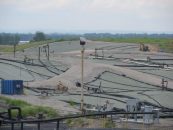Imagine being a child at recess again. You’re outside enjoying the day, but across the street is a landfill with trash trucks going by. Picture the smells, the noise, the inevitable debris, the skyline interrupted by mountains of waste. Unfortunately, this imaginary scene could become a reality for the students of Summit Pointe Elementary. Parents have called their officials to stop this, but many feel powerless.
In Fall 2022, a suburb of Kansas City called Raymore made an announcement that there was a landfill proposal in the works to be built right next to the KC-Raymore border. This landfill would also border (or be near) other local cities. Thousands would be impacted; the proposed site sits across the street from a public school and within a few miles of other community buildings. This spurred legislative action in the forms of HB909 and SB909 which would allow neighboring cities a voice in whether a landfill could be built next to them within a distance of one mile. In response, the developer behind the landfill proposal hired 19 lobbyists. The fight was on. Thousands of emails and calls to the Missouri House and Senate were made, but the ultimate result was a filibuster in the senate.
Following the filibuster, Kansas City banned landfills from being built in the city limits for one year but has not banned them permanently. This ordeal has led many to question if enough research has been done on landfills. We’ve discovered there are few studies on them despite the major impact they have on communities across the United States.
Therefore, a Jackson County health study was completed. It showed that living near a landfill would lead to increased chances of respiratory issues such as COPD, asthma, and additional diseases for the short term. It mentioned the concern of a landfill being placed near an elementary school. It also shockingly stated that the long-term health effects of residing near a municipal solid waste landfill have not been studied extensively in the United States.
It is noteworthy that, although the legislation was filibustered, funding for a study was passed in the senate but ultimately vetoed by Governor Parson. Determined not to give up, local citizens created a PAC called “Kill the Fill” to organize so we can further spread our message to people all over Missouri to share not only what is happening to us but also to help give this area a louder voice.
This isn’t just a local issue; this is an issue for all of us in Missouri—and beyond. No one should have to live with the threat of a health hazard ruining their community, especially children. The senators who filibustered the bill may not have been aware of the potential harm outlined in the results of the Jackson County health study. But now that the information is available, I’m imploring them to change their minds and support the wellbeing of communities south of the Kansas City border.
Many of Missouri’s politicians say they support local control for local issues. Therefore, I am calling upon all our state officials to act in the upcoming session. Empower our impacted towns by passing legislation allowing cities within one mile of a proposed landfill to have a voice in the matter. Please don’t allow thousands of lives to be put at risk.
For more information on our position, visit www.killthefill.org and follow the movement at “Stop The Lies! Stop The Landfill!” on Facebook.

Sarah Thompon is the PR Committee Co-Chair for the Kill the Fill PAC.











